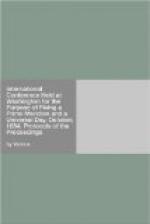Mr. RUTHERFURD, Delegate of the United States. Mr. President, I do not propose to take up the time of the Conference in reiterating the very conclusive remarks in favor of this resolution made by the Delegate of Great Britain. I wish, however, to allude, for a moment, to another view of this question. Suppose we do not adopt this resolution. What is the course before the Conference? We shall then be called upon, no doubt, to decide that longitude shall be counted all around the world from zero to 360 degrees.
That general proposition is one which would not probably meet with violent opposition, but the next point is one that will divide us very materially, and perhaps disastrously. Which way shall we count? Shall it be towards the east or towards the west?
My conversations with the gentlemen here present have lead me to know that there is a very great difference of opinion upon this point, and I believe that if we should not adopt this resolution and should decide to count longitude from zero to 360 degrees, a preference to count it in one direction rather than the other would be established only by a very close vote, nearly annulling the whole moral influence of the Conference, and we should go back to our Governments without much, if any, authority on the point in question.
And I doubt whether our resolutions would be accepted by these Governments if we show ourselves to be divided upon a question of so much practical importance.
It is simply a question of practice—of convenience. We all bowed to the rule of convenience in selecting the meridian of Greenwich. And why? Because seven-tenths of the civilized nations of the world use this meridian, not that it was intrinsically better than the meridian of Paris, or Washington, or Berlin, or St. Petersburg. Nobody claimed any scientific preference among these meridians. It was simply because seven-tenths of the civilized world were already using the meridian of Greenwich.
If we accept this argument in favor of the first resolution for selecting the initial meridian, why should we not be equally inclined to recognize the fact that all the civilized world count longitude in both ways? There is no difference of opinion on that point. There is no difference of usage. Shall we break that usage? Shall we introduce a new system, which may or may not be found practical or agreeable? Shall we not rather adopt the rule of all nations, already in use among their practised astronomers and navigators, by saying continue to do as you have already done?
Sir FREDERICK EVANS, Delegate of Great Britain. Having for many years mixed among the practical seamen of more than one nation, I confess I look with some dismay on any other system for the notation of longitude being adopted than the one proposed in this resolution.
My colleague, Mr. FLEMING, made the remark that he could not disassociate longitude from time. If he had mixed with seamen, he would have found out that there is very frequently a well-defined difference between the two in their minds. Longitude with seamen means, independently of time, space, distance. It indicates so many miles run in an east or west direction. Consequently, I am not able to look upon longitude and time as being identical.




